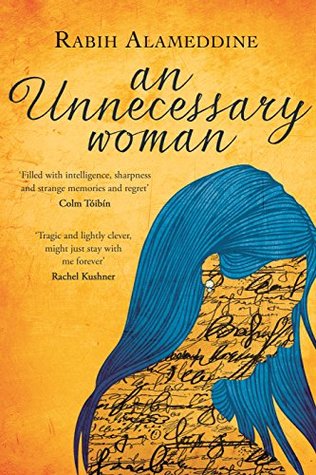More on this book
Community
Kindle Notes & Highlights
As I aged, as life isolated me more and more, I found myself discomfited by others. “Isolation has carved me in its image and likeness.”
contact with other people has never been my strong suit, but lately, in the last eight or nine years, or ten, it has produced a mild anguish that’s hard to define.
I once suggested that it wasn’t ethical for me to enter for free, that the museum needed our support, but he countered that the price of one ticket wasn’t going to bankrupt any coffer.
Even though I have walked up those stairs many times, I always feel that they’re built for descent and not ascent, an effect probably due to them splitting at the top and circling toward the unseen mezzanine.
No nostalgia is felt as keenly as nostalgia for things that never existed.
I pass a sign that says SALON AALIYA in Arabic lettering, though its Roman alphabet counterpart says SALON BEYONCÉ. I don’t know whether to laugh or cry. There are no customers in the barber chairs.
For years, since the end of the war in 1990, we deluded ourselves into thinking that we’d never fight each other again.
We, like most humans, consider history a lesson on a blackboard that can be sponged off. We’d rather ostrich life’s difficulties.
I can dig out the old chestnut from George Santayana, that “those who cannot remember the past are condemned to repeat it,” but it serves no purpose. It’s a hopelessly optimistic quote. We are condemned to repeat the past whether we remember it or not. It is inevitable; just ask Nietzsche (eternal return) or Hegel (history repeats itself) or James McCourt (history repeats itself like hiccups).
I’m fond of Mark Twain’s quote: “History doesn’t repeat itself, but it does rhyme.”
I’m sure you’ve noticed that I dislike Israel, that ridiculous pygmy state dripping with self-overestimation, yet many of the giants I respect are Jewish.
To write is to know that you are not home.
It is that longing for a mythical homeland, not necessarily a physical one, that inspires art.
A beggar by profession, she’s surrounded by the tools of her trade: a baby in her arms; a girl of about five with dirty dress and knees, hovering in the world of her mother; the eldest, a girl of no more than ten, sitting on the ground, back against the building wall as she examines me from afar.
Like most of us, she was suckled on the milk of patriarchy (the courage of men, the fidelity of women).
Anyone who says the pen is mightier than the sword has never come face-to-face with a gun.
I wish I’d listened to Chekhov, or had read him then: “If you are afraid of loneliness, don’t marry.”
Hannah had an uncanny ability to simply ignore unpleasantness,
“His only interest was in posturing, and only posturers are interested in him. A woman of your intelligence shouldn’t waste time reading Heidegger.
After all, anyone who says that displacement is a fundamental way of being in the world should have been considered a bit more seriously by the two of us.
He died early trying to help people see.
I sit by the window. And while I sit my youth comes back. Sometimes I’d smile. Or spit.
In Czech, according to Milan Kundera, litost is a state of agony and torment created by the sudden sight of one’s own misery.
Many suggest that we close the circle as we age by growing childlike. The way she sits, folded upon herself, I’d go as far as to say that she’s shrinking to fetus form.
I fill in the blanks with literary personas better than I do with real people, or maybe I make more of an effort.
I’m not sure how many sycamores remain, how many oaks or cypresses, but I can now walk for half an hour without encountering a single tree, and when I do, it’s usually a foreigner, a eucalyptus, jacaranda, or bottlebrush—nice but not satiating.
As she approached fifty in 1972, the Valium and Seconal pills would become part of her story, though not in the way one might assume. She plummeted—she dove into her abyss before Beirut dove into its own.
“Must there always be a reason for one to be happy?” she asked in feigned innocence.
Lebanese flags facing every possible direction drape across an electricity pole, making the green cedars, symbol of our pygmy state, look like they’re tumbling in a slow avalanche. Each sect wants to prove it is more Lebanese than the next, which explains the recent rise of puerile patriotism in our neighborhoods.
Arab nationalists who converted to socialism and socialists newly alert to the mobilizing virtues of nationalism.
Books became my milk and honey. I made myself feel better by reciting jejune statements like “Books are the air I breathe,” or, worse, “Life is meaningless without literature,” all in a weak attempt to avoid the fact that I found the world inexplicable and impenetrable.
The pleasurable sensation of almost arriving and the impatience of not yet being there begin at those markers.
Childhood is played out in a foreign language and our memory of it is a Constance Garnett translation.
Nostalgists insist on their revisionist vision of a hospitable, accepting city—a peaceable kingdom where all faiths and ethnicities were welcome, a Noah’s ark where beasts of every stripe felt at ease and unthreatened.
Would Noah have allowed a lesbian zebra aboard, an unmarried hedgehog, a limping lemur? Methinks not.
“No one in the whole world was as superfluous as he.” I beg to differ. No one in the whole world is as superfluous as I.


